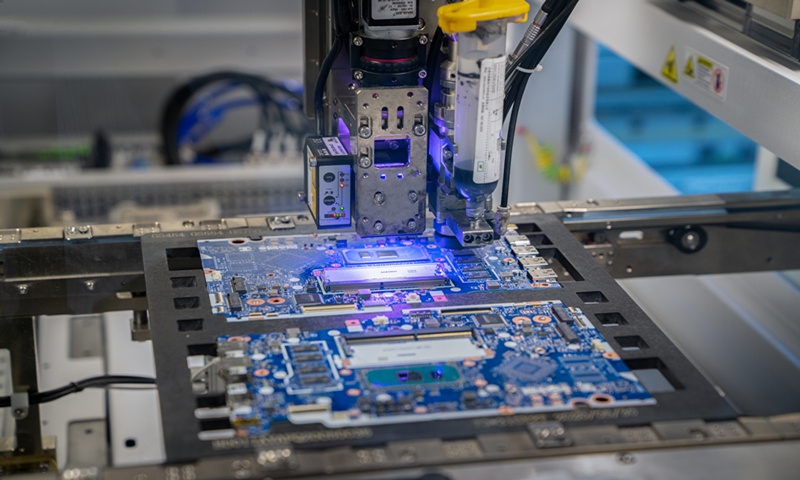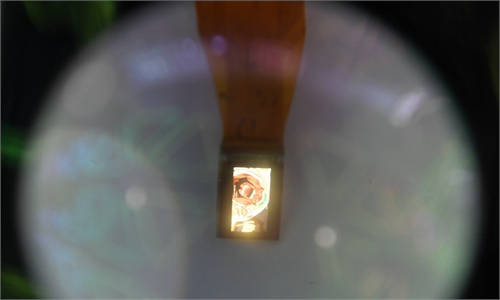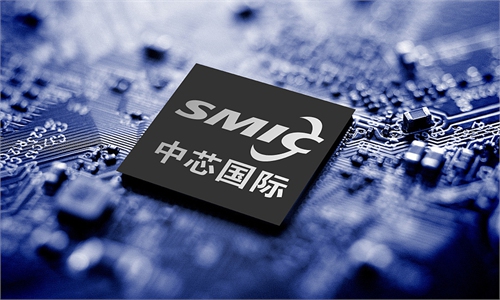Chip proposals flourish at two sessions as China aims for technology self-sufficiency
China aims for technology self-sufficiency to deflect US tech squeeze

A chip manufacture machine Photo: VCG
Integrated circuit (IC)-themed proposals and motions have been all the rage during the "two sessions", as eagerness grows over China's push for semiconductors self-sufficiency amid the US-led tech decoupling.
Such suggestions are supposed to make a stronger case for progress in the chip rush, analysts said, as they called for greater efforts to ratchet up innovation and production of microchips. More importantly, more efforts are required to promote the use of locally developed chips.
The post-Moore's Law era offers a rare opportunity for IC technology and industry development, fanning hopes for China to catch up with the Western advanced countries at a quicker pace, the China Business Journal reported, citing Deng Zhonghan, commander-in-chief of the Starlight China Chip Project and a member of the 13th National Committee of the Chinese People's Political Consultative Conference (CPPCC).
As the Moore's Law era comes to an end, a prime engine of technological progress is running out of steam, and so it's no longer enough to pack more transistors onto each chip to enhance performance.
Addressing the West's crackdown on Chinese IC firms that inhibits purchase of advanced mask aligner items, amplifies the shortage of high-end materials and professional talent, Deng proposed that the rollout of more powerful policies could be considered, in proportion to hyper-conventional moves recently unveiled by the US, EU, Japan and South Korea.
Major developed economies have lately upped the ante in their chip-centric initiatives. US President Joe Biden on Wednesday pressed Congress to finalize a bill meant to beef up US competitiveness against China. The bill would include potentially funds of $52 billion for the US semiconductor sector.
The European Commission, for its part, proposed the European Chips Act in February, which includes the Chips for Europe Initiative with 11 billion euros ($12.17 billion) made available to strengthen chip research, development and innovation.
Japan and South Korea have also rolled out semiconductor-tailored plans with more ambitious goals.
According to Deng's proposal, China should continue to make the best of the new system of pooling national resources, and ramp up policy and funding support for IC initiatives.
The sci-tech innovation-heavy STAR Market in Shanghai, as the chip scientist advised, needs to expedite listings of core chip businesses.
In a recent interview with the Securities Times, Zhou Yanli, CPPCC member and former vice chairman of the country's insurance regulator, said that reforms of the market-based use of insurance funds ought to be deepened, funneling long-term stable funds into firms committing to innovations.
As of the end of 2021, the outstanding insurance funds invested in high-tech projects, ranging from new materials and chips to 5G, had hit 55.25 billion yuan ($8.74 billion).
A flurry of chip-focused suggestions during the two sessions indicates a more imperative drive toward fostering the country's homegrown chip prowess, Ma Jihui, a veteran telecommunication industry analyst based in Beijing, told the Global Times on Thursday.
"But other than an even sharper focus on chip self-sufficiency, what the country needs is specific plans that break down the national vision into feasible projects that fit into those chip-hungry industries," Ma said.
Rather than a host of local governments flooding into chip initiatives, an issue often seen whenever a national economic push tops the government agenda, a more nuanced and sophisticated approach to calibrating the chip push is needed, he noted.
Also, businesses and private capital need to play more prominent roles in commercializing research results, analysts said.
One of the weak links of the indigenous chip push is the insufficient use of locally developed chip products, according to Ma, due to concerns that some local chips are not on par with their overseas peers. The success of China's homegrown BeiDou Navigation Satellite System could be drawn upon to allow for the use of domestic chip products on a large scale. BDS was initially adopted in maritime rescue before being applied in ships and vehicles.
In a statement sent to the Global Times outlining his proposal, Baidu CEO and CPPCC member Robin Li Yanhong called for an accelerated push for green artificial intelligence (AI), referring to the use of green power and algorithms to enable improved energy efficiency and reduced carbon emissions from data centers.
For that to happen, businesses need to be guided toward research and procurement of energy-efficient AI chips, thereby better aligning with green algorithms, Li said.
As regards chips, a cornerstone in the push for smart and electric vehicles, Zeng Qinghong, chairman of Guangzhou Automobile Group and a deputy to the 13th National People's Congress, said that the country's auto chip self-sufficiency stands at less than 10 percent, and short of 5 percent of the country's chip supplies are sourced domestically for its auto sector, according to the Beijing News.
The government, research institutions and the business community will need to act in concert to resolve chip bottlenecks. This means a joint effort is required to ensure chip supplies in the short term while ramping up moves to build strength across the supply chains for auto-specific chips, Zeng said.



